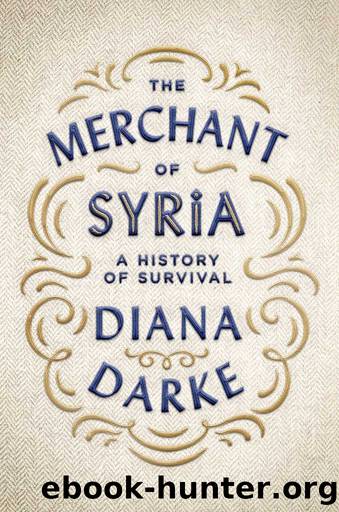The Merchant of Syria by Diana Darke

Author:Diana Darke
Language: eng
Format: epub
Publisher: Oxford University Press
Published: 2018-08-15T00:00:00+00:00
10
EXPANSION INTO LEBANON
Life is borrowing and paying back.
(Lebanese proverb)
âGo westââthat was one of Abu Chakerâs oft-repeated adages to his sons. When he made the decision in 1959 to move his family and his business from Syria to Lebanon, he put his own advice into practice. The stresses and strains of life in Syria had started to become very difficult for families like the Chamsi-Pashas in the late â50s and early â60s. Nasserâs socialism and the decision of Syria to unite with Egypt to form the United Arab Republic had many consequences for the landed elites, and Abu Chaker realised that if his business was going to survive and have any chance of thriving, he would have to move to the much more economically progressive milieu of Lebanon.
During the French Mandate there had been complete economic unity between Syria and Lebanon, with joint customs, a unified currency and tax system, free movement of capital and people and unrestricted freedom of work in both countries. After independence, the two governments had then signed the Chtoura Agreement to form one customs area. But as their economic policies diverged ever further from each other in styleâwith the Lebanese as transit brokers favouring an outward-looking âopen doorâ policy with no state interference, and the Syrians insisting on military-backed state interventionism and protectionism for their new industries and agricultural enterprisesâit became clear the customs union was no longer sustainable.
Homs had historically developed business links less with Aleppo and Damascus than with its nearest port cities, Tripoli and Beirut, with which it had closer geographical ties. The new port of Lattakia that the Syrian government developed after independence was much further north, closer to Aleppo. As his textile import and wholesale business was growing, Abu Chaker did not want his ambitions to be thwarted by the new climate in Syria, its military interference in politics and its economic nationalism, through which it sought to control the movement of goods, people and capital. Given he was not one to align himself politically with those who might have helped him expand his business or promote it, he knew his aspirations could only be fulfilled by leaving the country. He had to prepare how best to enact his decision.
Before his big move to Beirut, Abu Chaker felt compelled to sell his fine black 1957 Chevrolet Bel Air. It was important to avoid drawing attention to himself, and as one of only two in the whole of Homs, the car was too conspicuous. The other was owned by an Atassi, a cousin of Rihabâs, who was a civil engineer. When the mukhabarat (intelligence authorities) visited him, intending to impound the Chevrolet, Abu Chaker was able to tell them, truthfully, that he had sold it the week before.
Not wanting to cut his losses permanently, however, Abu Chaker decided to keep the flat where he and his family had lived since his marriage to Rihab, and to keep the shop open in the souk in Homs. He would expand into Beirut for his major operations, without flagging the fact up to the Syrian authorities.
Download
This site does not store any files on its server. We only index and link to content provided by other sites. Please contact the content providers to delete copyright contents if any and email us, we'll remove relevant links or contents immediately.
The European Opportunity by Felipe Fernández-Armesto(568)
The European History Highway: A Guide to Internet Resources by Dennis A. Trinkle Scott A. Merriman(534)
Morgan Kaufmann Digital Watermarking and Steganography by Ingemar Cox Matthew Miller Jeffrey Bloom Jessica Fridrich Ton(528)
The Seven Wonders of the Ancient World by Michael Denis Higgins(518)
Hyperculture by Byung-Chul Han(501)
European Security in a Global Context by Thierry Tardy(501)
European Security without the Soviet Union by Stuart Croft Phil Williams(501)
The Routledge companion to Christian ethics by D. Stephen Long Rebekah L. Miles(496)
Get Real with Storytime by Julie Dietzel-Glair & Marianne Crandall Follis(443)
Hudud Al-'Alam 'The Regions of the World' - a Persian Geography 372 A.H. (982 AD) by V. V. Minorsky & C. E. Bosworth(436)
Gorbachev And His Generals by William C. Green(427)
Tibetan Studies in Comparative Perspective by Chih-yu Shih Yu-Wen Chen(426)
Governance, Growth and Global Leadership by Espen Moe(417)
How Languages Are Learned 5th Edition by Patsy M Lightbown;Nina Spada; & Nina Spada(405)
CliffsNotes on Fitzgerald's The Great Gatsby by Kate Maurer(398)
The Oxford History of the World by Fernández-Armesto Felipe;(388)
The Egyptian Economy, 1952-2000 by Khalid Ikram(376)
Oral Poetry and Narratives from Central Arabia: The Poetry of Ad-Dindan : A Bedouin Bard in Southern Najd (Studies in Arabic Literature, Vol 17) (English and Arabic Edition) by P. M. Kupershoek P. Marcel Kurpershoek(365)
The Oxford Handbook of the Incas by Sonia Alconini(364)
